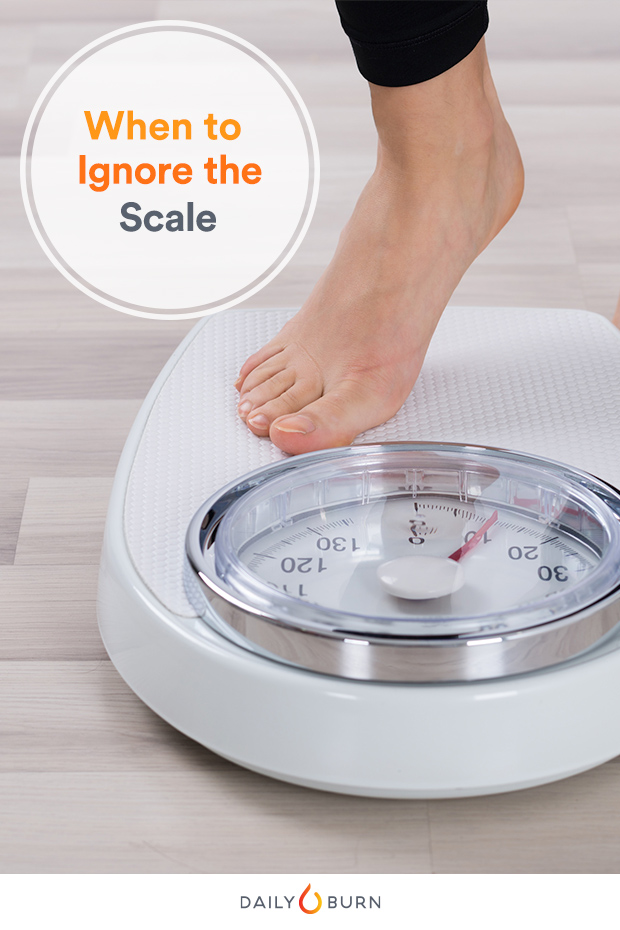
You step on the scale in the morning and the digital numbers flash quickly like a slot machine. Cue imaginary drumroll and…Ta-da! The result is a happy one, and it’s automatically a good day! All those workouts and weekly meal planning are finally paying off. But then, you decide to weigh yourself before you go to bed, and the scale shows a four-pound weight increase…What the what?
RELATED: Real Talk: How Often Should You Weigh Yourself?
Did you really gain four actual pounds over the course of a single day? Here’s what you need to know about that shifting number on the scale.
The Truth About Weight Fluctuation
When it comes down to it, water is a main culprit in weight fluctuation. Daily or hourly changes in weight are often due to how much H20 you’ve got inside. “Throughout the day, our body will hold onto fluids as we eat and drink,” says Kelly Hogan, MS, RD, CDN, clinical nutrition coordinator at the Dubin Breast Center at Mount Sinai Hospital. “Just two cups of water — and there’s water in food, too — can add an extra pound.” And that has nothing to do with your percent of body fat or muscle.
Wondering why you feel lighter after a super sweaty hot yoga class? While you may weigh less immediately after an intense workout, you might weigh more if your muscles are hoarding fluids. “Resistance training or even trying a new workout can result in fluid retention if the muscles are worked hard,” says Hogan. ”Part of the body’s response when repairing microscopic tears in muscle is fluid retention.”
RELATED: 10 Ways to Stay Hydrated (That Aren’t Water)
Keep in mind: When you see that number quickly go up and down on the scale, it’s certainly not pounds of fat magically appearing or disappearing. “It [is] physiologically impossible to gain or lose three to five pounds of fat overnight, no matter what the scale says,” Hogan says.
RELATED: The Truth About How to Lose Belly Fat
What you eat, drink and do during the day plays an important role in how much you weigh. If you eat a lot of salty food, you retain fluid, causing you to feel bloated and potentially see a higher number on the scale. Similarly, carbohydrate intake can influence how much water our bodies hold, since our bodies need additional H20 to store glycogen (carbs) for energy. To save each gram of glycogen, we need three grams of water. “This is why endurance athletes who carb-load tend to gain water weight in the days leading up to their races, and why people on low-carb diets lose weight so quickly at first,” Hogan says.
Water Weight Gone Wrong
Another sneaky source of temporary weight gain: dehydration. While body builders and fitness models often intentionally cut down on water before competitions or photo shoots to show off more defined muscles, depleting your body of liquids can actually make you retain water. “When we don’t drink enough fluids, our bodies hold on to whatever water we do have in us to maintain fluid balance,” says Hogan. “Then, our kidneys excrete fewer fluids via urine because they’re training to maintain that balance, and that can make the scale go up.”
Plus, the rapid, intentional weight loss tactics used by body builders certainly aren’t your best bet for sustainable weight loss. So drink up, and your body will find its liquid equilibrium. (Just make sure you’re not rehydrating at happy hour. Alcohol is particularly dehydrating, so you may see the number on the scale creep upwards after a night on the town.)
RELATED: Your Body on..Booze
How to Weigh Yourself
If you’re going to put a lot of weight (pun intended!) into the number on the scale, take a consistent and calculated approach to assess how much your body is actually changing. For starters, do it on the same scale, in the same place and at the same time every week. Wear as few clothes as possible, since heavy jeans or belts will make your measurement less accurate. Also try to go to the bathroom beforehand. (You’ll weigh less after you pee or have a bowel movement.)
When it comes to frequency, you might even want to consider weighing yourself just once or twice a week instead of daily, so you’ll avoid the mind games that come with constantly fluctuating numbers.
The Bottom Line
While the scale can be a useful tool to hold yourself accountable, it shouldn’t be the only way you assess how healthy you are. Your weight may not budge, but you might be making healthy changes to your diet or potentially building muscle.
“Remember to look at the big picture,” says Hogan. “Progress over one or two months says a lot more than a few days or even a week.” Check in with how your clothes fit, or take weekly measurements of your stomach, thighs, hips and arms.
What other amazing things can happen to your body? Check out these non-scale victories that are just as sweet as seeing the scale change.
